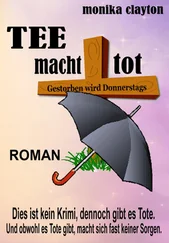Until Doris Flinkenberg herself in the middle of Maj-Gun’s stupid song hissed, angrily, almost disgusted: “What the hell do you want from me you damned idiot?”
Then Maj-Gun lost all interest and Doris Flinkenberg left and that was the last Maj-Gun had seen of her because Doris killed herself a few days later. But from there, when Maj-Gun had known that and had all the time in the world to think about Doris and what had been said between them—most of all, everything that had not been said but insinuated in passing,—from there, in any case, a crazy story was born. The Boy in the woods , which here, now in the middle of the square with Solveig, ends.
Like all stories end.
Here again, in absolute reality, realism.
Though the song does not stop because of that; Maj-Gun’s own little folk song, it keeps playing in her head and her body, like a mockery.
And Maj-Gun, on the square, fingers like ice cubes: all of the things she is carrying that slip from her hands, fall down on the ground. “The Book of Quick-Witted Sayings,” the shirt, the carton of cigarettes, the opened pack of cigarettes among others. Because suddenly she has known, an insight that becomes formulated clearly first somewhat later but it comes to her exactly here and now. She cannot keep the child. She cannot. It was never hers.
“Here, the cigarettes.” Solveig helps her pick things up off the ground.
“And good luck with school!”
They go their separate ways, Maj-Gun and Solveig, each in her own direction on the square.
•
“You look fresh. Pale. But fresh. Have you also started dieting?”
“After the Scarsdale Diet, anything is possible. Strong character and discipline. Starting anything is difficult. Then it becomes a habit.”
And just a few minutes later Maj-Gun is sitting at the table in the cozy kitchen in the Sumatra house, where she lived as a renter for several years up until the beginning of November, stuffing down Danishes that her former landlady Gunilla had purchased expressly for this afternoon when she has a free period from school and Maj-Gun, as agreed, arrived to settle business. Pay the outstanding rent, empty the room, say good-bye. “Oh, sweet Maj-Gun we’re going to miss you, and the kids will miss you too! They’re at school now. Look at what they drew for you as a farewell present!”
A drawing representing a large monster sitting in a recliner: “Good-bye Terrible Animal Child!” it reads under the drawing in straggling middle school handwriting followed by a red heart, and it cannot be helped, Maj-Gun is moved to tears; she likes those kids so much, the kids who would often stand at the door to her room with the desk and the Thinking Chair upstairs despite the fact that their parents, “Gunilla,” “Göran,” often rebuked them with shhhh, the genius is working, don’t disturb! “Grrr , Terrible Animal Child, come out and play!” The Animal Child, that was Maj-Gun’s own name she used with the kids, she had come up with it herself.
•
“And how was it at the rectory?” Maj-Gun replies “fine.” As usual she cannot hide how much Gunilla also always appreciated that Maj-Gun Maalamaa, that she in particular, their renter, was the daughter of the former, very well-liked vicar. In the beginning, to the point it was almost uncomfortable.
Not to mention, what a transition. From the other rental place, Java, the rug rags, Susette Packlén, to Sumatra, here . Suddenly being someone. How Gunilla, otherwise a robust woman, a math teacher at the junior high school and the high school, rather round as Maj-Gun herself had gradually become here at the house, but partially due to other reasons, without space , it was true too—that Gunilla was almost embarrassed in front of the old pastor’s daughter about everything that perhaps was not “proper” enough in this house. Not only that the classics were missing and all sorts of good literature on the bookshelves, bookshelves were missing altogether in that sense, instead filled with other knickknacks and record collections, but everything with the furnishings was always turning out wrong wrong… probably had something to do with her senses of color and taste not being as they should be, in a fundamental way, so to speak. Regardless of how she approached the business of furnishing the home, buying wallpaper, paint samples, different types of knickknacks, and other things to place tastefully here and there.
“Maj-Gun, do you think this is nice?” she had a habit of asking anxiously, as if Maj-Gun, just because she was who she was and not to mention was sitting upstairs in her room, “with the Literature,” which Maj-Gun already at that time, in other words, was writing that Book. “The Manuscript,” which Maj-Gun later, with a growing irritation that was not dependent on Gunilla though Gunilla thought so, had corrected her.
“Maj-Gun, do you think this looks nice?” Maj-Gun had replied: “‘1,001 Castles to Furnish Before You Die,’ Gunilla, I don’t know anything about home furnishings.” As was the case but it was also an amusing line from “The Book of Quick-Witted Sayings,” at least she thought so herself, but Gunilla had not understood the verve in the quote, had only become sadder. Sighing, uncertain: “Well, maybe one should find another hobby.” And flipped through to a new page in the magazines Maj-Gun tended to bring home from the newsstand and of course she did not have to flip through for very long before, quite right, a new possibility had revealed itself. Inga and Petrus have wine tasting as their hobby . “Maybe that could be something?” But then quickly changed her mind again: “Yes, of course, I know you don’t drink , if you’re going to create something then you need to do it with a sober mind, right?”
And Maj-Gun had smiled mysteriously, like a real sphinx, because at that point she had of course quite simply started hating that word, “create,” but could not show it, she liked Gunilla, after all, did not want to make her sad. “Yes, for a while now I’ve been in the working and editing phase in close contact with the Book Editor, then what is known as the finalspurt remains.”
“And may I ask how it’s going with the Bo—” Had, like always with Gunilla, come back to the same thing.
And Maj-Gun’s angry shrug of the shoulders, which had given rise to even more misunderstandings. “Yes, sorry, I’m walking along like an elephant in a china factory.”
But Maj-Gun, with regard to her size, had laughed loudly. The Book, the Manuscript. Or whatever it was called, Authorship. That was in a way what was wrong with everything after all, or had started to be, there in the cozy house, the cozy family life. I am a dwarf in these rooms , Maj-Gun tried to say to herself, but it did not fit either really. Because otherwise, if it were not for “the Book,” which had started taking on mystical proportions at that kitchen table, “go upstairs and work, write,” then Maj-Gun would have been able to spend time sitting in the kitchen with Gunilla whom she really appreciated and talk chitter chatter about just about anything, “One should really start dieting.”
“Listen to this, Gunilla, what your stomach fat says about your character.” A funny thing she had also written in “The Book of Quick-Witted Sayings.” But the talk, which there was not anything special about, still fun, relaxing.
And Göran and the kids too, of course, when they were in the kitchen. “Maj-Gun is walking around here like a Poet in Bourgeoisie,” Göran could say, with a funny tone of voice, and then all of them could actually laugh, a bit relieved.
On the other hand: “I should probably go up and write some now,” because right then, in moments like that with Göran and Gunilla and the kids in the kitchen, Maj-Gun had once again been reminded in some way about something she should have. Like flipping through to find a new page in a magazine. Get something like that for herself. Become hungry like a wolf , go to the movies, the disco, out and hunt.
Читать дальше











